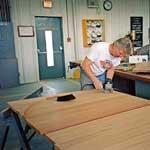BP Oil Spill Updates
- Rockdoc
-

- Mountain Legend
-

Please Log in or Create an account to join the conversation.
- outdoor338
-

- Mountain Legend
-

- Posts: 3660
- Thank you received: 0
Please Log in or Create an account to join the conversation.
- LOL
-

- Mountain Legend
-

- Posts: 6393
- Thank you received: 18
Wouldn't it be better to pump the field out to reduce the pressure and potential for future leaks? Just wondering???
If you want to be, press one. If you want not to be, press 2
Republicans are red, democrats are blue, neither of them, gives a flip about you.
Please Log in or Create an account to join the conversation.
- Photo-fish
-

- Mountain Legend
-

- Posts: 3975
- Thank you received: 14
´¯`•.. ><((((º>`•´¯`•...¸><((((º> ´¯`•.. ><((((º>`´¯`•...¸><((((º>´¯`•.. ><((((º>`•´¯`•...¸><((((º> ´¯`•.. ><((((º>`•.´¯`•...¸><((((º>
Please Log in or Create an account to join the conversation.
- Rockdoc
-

- Mountain Legend
-

Joe wrote: Question for any oil/geology experts. How permanent is this planned fix to pump mud and concrete in the hole? It seems to me concrete would degrade over time under pressure and salt water conditions? Will it last 100 years? 500 years? It seems to me concrete fails over time.
Wouldn't it be better to pump the field out to reduce the pressure and potential for future leaks? Just wondering???
Concrete plugs are standard for plugging a well. Mud use in drilling is not the stuff you find in mud puddle. Instead it is a very carefully engineered slurry whose wight is designed to offset reservoir pressure. It itself does not degrade even if a cement plug were to degrade. The cement also is highly engineered. Think about the cement used in dams and for causeway pillars. These not only have exposure to water and sea water respectively, but are also subject to physical stresses such as wave action and currents, both of which impose physical wear. Having said all that, an oil reservoir such as the one in question will not last 100 years. Before that time the oil will be depleted and replaced by sea water. Oil reservoir pressures capable of spewing oil come largely from an expanding gas cap at the top of the oil. Once depleted, mature oil fields require the installation of pumps or the injection of gas to bring the remaining oil to the surface. Hence it is not to be feared that a similar catastrophe awaits us down the road 100 years later from this particular field.
Please Log in or Create an account to join the conversation.
- LOL
-

- Mountain Legend
-

- Posts: 6393
- Thank you received: 18
I was just curious why not pump out the oil first and relieve the pressures first, then seal it. Doesn't sound like that is the plan.
If you want to be, press one. If you want not to be, press 2
Republicans are red, democrats are blue, neither of them, gives a flip about you.
Please Log in or Create an account to join the conversation.
- Photo-fish
-

- Mountain Legend
-

- Posts: 3975
- Thank you received: 14
´¯`•.. ><((((º>`•´¯`•...¸><((((º> ´¯`•.. ><((((º>`´¯`•...¸><((((º>´¯`•.. ><((((º>`•´¯`•...¸><((((º> ´¯`•.. ><((((º>`•.´¯`•...¸><((((º>
Please Log in or Create an account to join the conversation.
- UNDER MODERATION
-
 Topic Author
Topic Author
- Visitor
-

Joe wrote: Question for any oil/geology experts. How permanent is this planned fix to pump mud and concrete in the hole? It seems to me concrete would degrade over time under pressure and salt water conditions? Will it last 100 years? 500 years? It seems to me concrete fails over time.
Wouldn't it be better to pump the field out to reduce the pressure and potential for future leaks? Just wondering???
Ha ha ha- No Joe, it's not going to spew oil into eternity. For reasons too complicated to explain in laymens terms eventually the pressure will subside and the threat of further large scale leaks will be negligible at best.
Please Log in or Create an account to join the conversation.
- UNDER MODERATION
-
 Topic Author
Topic Author
- Visitor
-

Photo-fish wrote: I thought that was what the relief wells were for? Aren't they still drilling those?
Yes they are...I've predicted they will be fully operational on sept 4th, and thats factoring set backs due to weather or the unexpected substrata
Please Log in or Create an account to join the conversation.
- LOL
-

- Mountain Legend
-

- Posts: 6393
- Thank you received: 18
Vice Lord wrote: "For reasons too complicated to explain in laymens terms"....Translation: I don't know WTF I am talking about.... LOL
VL, I thought you were a lowly Union Airline Baggage handler? What do you know about oil wells? BTW, I am still missing some bags from a Chicago flight in 1998. Do you have them? LOL
If you want to be, press one. If you want not to be, press 2
Republicans are red, democrats are blue, neither of them, gives a flip about you.
Please Log in or Create an account to join the conversation.






